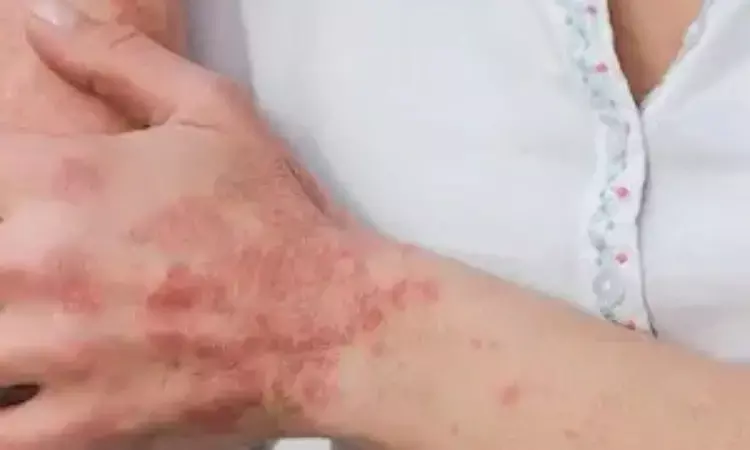- Home
- Medical news & Guidelines
- Anesthesiology
- Cardiology and CTVS
- Critical Care
- Dentistry
- Dermatology
- Diabetes and Endocrinology
- ENT
- Gastroenterology
- Medicine
- Nephrology
- Neurology
- Obstretics-Gynaecology
- Oncology
- Ophthalmology
- Orthopaedics
- Pediatrics-Neonatology
- Psychiatry
- Pulmonology
- Radiology
- Surgery
- Urology
- Laboratory Medicine
- Diet
- Nursing
- Paramedical
- Physiotherapy
- Health news
- Fact Check
- Bone Health Fact Check
- Brain Health Fact Check
- Cancer Related Fact Check
- Child Care Fact Check
- Dental and oral health fact check
- Diabetes and metabolic health fact check
- Diet and Nutrition Fact Check
- Eye and ENT Care Fact Check
- Fitness fact check
- Gut health fact check
- Heart health fact check
- Kidney health fact check
- Medical education fact check
- Men's health fact check
- Respiratory fact check
- Skin and hair care fact check
- Vaccine and Immunization fact check
- Women's health fact check
- AYUSH
- State News
- Andaman and Nicobar Islands
- Andhra Pradesh
- Arunachal Pradesh
- Assam
- Bihar
- Chandigarh
- Chattisgarh
- Dadra and Nagar Haveli
- Daman and Diu
- Delhi
- Goa
- Gujarat
- Haryana
- Himachal Pradesh
- Jammu & Kashmir
- Jharkhand
- Karnataka
- Kerala
- Ladakh
- Lakshadweep
- Madhya Pradesh
- Maharashtra
- Manipur
- Meghalaya
- Mizoram
- Nagaland
- Odisha
- Puducherry
- Punjab
- Rajasthan
- Sikkim
- Tamil Nadu
- Telangana
- Tripura
- Uttar Pradesh
- Uttrakhand
- West Bengal
- Medical Education
- Industry
Subcutaneous high-dose spesolimab prevents flares in patients with generalised pustular psoriasis

A recent study involving the anti-interleukin-36 receptor monoclonal antibody, Spesolimab, has demonstrated its effectiveness in preventing flares of Generalised Pustular Psoriasis (GPP). The results indicate a significant reduction in GPP flare occurrence over 48 weeks, with high-dose Spesolimab emerging as a superior preventive treatment. Such a treatment approach could have a profound impact on patient morbidity and quality of life.
This study was published in The Lancet by Akimichi Morita and colleagues. This Phase 2b trial was conducted across 20 countries, involving 123 participants with a history of GPP and a low GPP Physician Global Assessment (GPPGA) score at screening and random assignment. A multicenter, randomised, placebo-controlled Phase 2b trial conducted at 60 hospitals and clinics. 123 individuals aged 12 to 75 with a history of GPP as per the European Rare and Severe Psoriasis Expert Network criteria. All patients had a GPPGA score of 0 or 1 at screening and random assignment. Patients were randomly assigned to receive subcutaneous placebo, subcutaneous low-dose Spesolimab, subcutaneous medium-dose Spesolimab, or subcutaneous high-dose Spesolimab over 48 weeks. The primary objective was to demonstrate a non-flat dose-response curve on the primary endpoint, time to first GPP flare.
- A non-flat dose-response relationship was established.
- By week 48, 35 patients had GPP flares. High-dose Spesolimab was significantly superior to placebo in preventing GPP flares (HR=0·16).
- Low-dose and medium-dose Spesolimab also showed benefits with HRs of 0·35 and 0·47, respectively, compared to placebo. Infection rates were similar across treatment arms, with no serious adverse events or deaths reported.
The study reveals a major shift in the clinical approach to GPP treatment. High-dose Spesolimab demonstrated effectiveness in preventing GPP flares, which can be a significant improvement in patient care and overall quality of life.
Reference:
Morita, A., Strober, B., Burden, A. D., Choon, S. E., Anadkat, M. J., Marrakchi, S., Tsai, T.-F., Gordon, K. B., Thaçi, D., Zheng, M., Hu, N., Haeufel, T., Thoma, C., & Lebwohl, M. G. Efficacy and safety of subcutaneous spesolimab for the prevention of generalised pustular psoriasis flares (Effisayil 2): an international, multicentre, randomised, placebo-controlled trial. Lancet,2023. https://doi.org/10.1016/s0140-6736(23)01378-8
Dr Riya Dave has completed dentistry from Gujarat University in 2022. She is a dentist and accomplished medical and scientific writer known for her commitment to bridging the gap between clinical expertise and accessible healthcare information. She has been actively involved in writing blogs related to health and wellness.
Dr Kamal Kant Kohli-MBBS, DTCD- a chest specialist with more than 30 years of practice and a flair for writing clinical articles, Dr Kamal Kant Kohli joined Medical Dialogues as a Chief Editor of Medical News. Besides writing articles, as an editor, he proofreads and verifies all the medical content published on Medical Dialogues including those coming from journals, studies,medical conferences,guidelines etc. Email: drkohli@medicaldialogues.in. Contact no. 011-43720751


